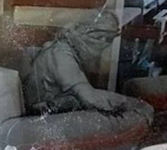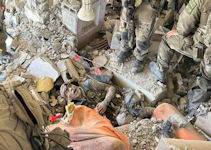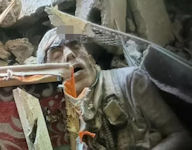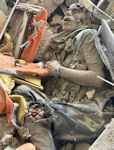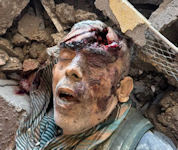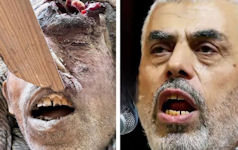Yahya Sinwar / Abu Ibrahim
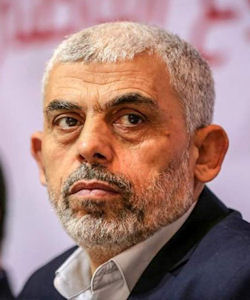 The Israeli army reported 17 October 2024 the liquidation of the new Hamas leader Yahya Sinwar in the Gaza Strip. The Shin Bet revealed that the assassination of Sinwar was accidental and not planned. Rather, the operation was carried out by an infantry force of the occupation army without the participation of special units and not under targeted guidance from the Israeli intelligence services, according to the Israeli army radio. Israeli analysts have long said that a picture of Yahya Sinwar killed or captured might be enough for Benjamin Netanyahu to declare victory in Gaza and end the war. Sinwar's successor is likely not to give up the positions held by the slain leader unless he submits to pressure from the various parties.
The Israeli army reported 17 October 2024 the liquidation of the new Hamas leader Yahya Sinwar in the Gaza Strip. The Shin Bet revealed that the assassination of Sinwar was accidental and not planned. Rather, the operation was carried out by an infantry force of the occupation army without the participation of special units and not under targeted guidance from the Israeli intelligence services, according to the Israeli army radio. Israeli analysts have long said that a picture of Yahya Sinwar killed or captured might be enough for Benjamin Netanyahu to declare victory in Gaza and end the war. Sinwar's successor is likely not to give up the positions held by the slain leader unless he submits to pressure from the various parties.
Drone footage released by the Israel Defense Forces (IDF) appears to show Hamas leader Yahya Sinwar in the moments before he was killed. In the video, taken from an IDF drone which appears to have flown into the ruins of a bombed out house in Rafah in the Gaza Strip, a dust-covered and hooded figure can be seen sitting in an armchair, visibly injured. The figure, which the IDF having later checked DNA records says is Sinwar, appears to throw a small plank of wood at the drone before the camera turns away and the video ends. Footage emerged of Yahya Sinwar's body discovered by Israeli soldiers, which, when compared to photographs taken during his lifetime, left no doubt that the leader of the Palestinian movement had embraced martyrdom. The photos made it very likely that it was him: the bite, the teeth themselves, the mole on the left side of the face, the ears, the eyebrows.
The I.R.Iran Mission to UN in New York stated: "when Muslims look up to Martyr Sinwar standing on the battlefield—in combat attire and out in the open, not in a hideout, facing the enemy—the spirit of resistance will be strengthened. He will become a model for the youth and children who will carry forward his path toward the liberation of Palestine. As long as occupation and aggression exist, resistance will endure, for the martyr remains alive and a source of inspiration."
On 17 May 2025, Zakaria Sinwar, one of Yahya Sinwar's brother, was reported killed in an Israeli airstrike in the central Gaza Strip. According to media reports, Zakaria Sinwar was killed along with three of his children in a strike on the Nuseirat refugee camp. He had previously worked as a lecturer of modern and contemporary history at the Islamic University in Gaza.
Hamas named militant commander Yehiya Sinwar [aka Abu Ibrahim ] as it new political bureau head on 06 August 2024, succeeding the late Ismail Haniyeh , who was assassinated in the Iranian capital, Tehran, a week earlier. The Hamas leadership and its Shura Council met over several days to choose a successor to the head of the movement's political bureau, where they all agreed in the movement's various institutions that make decisions related to its presidency to choose Sinwar, and pledged allegiance to him on that.
The movement said in a brief statement published on Tuesday evening, "The Islamic Resistance Movement (Hamas) announces the selection of leader Yahya Sinwar as head of the movement's political bureau, succeeding the martyr leader Ismail Haniyeh, may God have mercy on him."
Hamas leader Osama Hamdan said the selection of Sinwar came "to confirm the unity of the movement and its awareness of the dangers it faces, and to confirm that the policy of assassinations practiced by the enemy against our leadership and resistance will not succeed in breaking the back of the resistance or in weakening it," noting that the movement is choosing a leader to lead the battle directly in confronting the occupation."
There were a set of considerations that governed the selection of the movement's leader, including what was required of this leader, his qualifications and the extent of his ability to unite the movement's ranks and lead its battle, in addition to assessing the position of the political environment, whether in the clash with the occupation or the regional and international environment.
"The decision was made based on Sinwar's position within the movement, as he had risen through Hamas' leadership positions early on, and when he was released from Israeli prison, he worked within its ranks and assumed organizational positions with a political and military color. In his position as a leader in the Gaza Strip, he was carrying out organizational work that has a political aspect and a jihadist resistance aspect."
The Popular Front for the Liberation of Palestine expressed its wishes for Sinwar's success in "bearing the great responsibility as a successor to Haniyeh." The Front affirmed its confidence in "the ability of the brothers in Hamas to overcome the ordeal and the great tragedy of the martyrdom of the leader Ismail Haniyeh, and to continue his path and the path of all the martyr leaders." Palestinian media quoted the Secretary of the Central Committee of the Palestinian National Liberation Movement ( Fatah ), Jibril Rajoub, as saying that Sinwar is “a pragmatic personality, a realistic and logical man, and that is how I knew him in and out of captivity.” Rajoub added that the decision to choose Sinwar is " a logical and expected response to the assassination of the martyr Ismail Haniyeh."
Lebanese Hezbollah said in a statement that choosing Sinwar "from the heart of the besieged Gaza Strip, who is with his mujahid brothers in the front trenches of the resistance and among his people under the rubble, siege, killing and starvation, is confirmation that the goals sought by the enemy in killing leaders and officials have failed to achieve their goal." Israeli Foreign Minister Israel Katz said, "The appointment of the murderer Sinwar as leader of Hamas is another reason to eliminate him and erase the memory of this organization from the face of the earth." The Israeli Broadcasting Corporation said that the appointment of Sinwar as head of Hamas was "surprising, and a message to Israel that he is alive and that the Hamas leadership in Gaza is strong, existing and will remain."
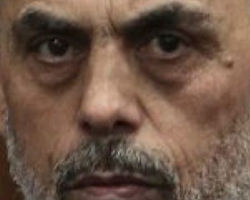 Hamas named militant commander Yehiya Sinwar as its new leader in the Gaza Strip on 13 February 2017, placing one of the Islamic militant group's most hard-line figures in charge of its core power base. Al-Sinwar is described as a cautious personality. He does not speak much and rarely appears in public. He also possesses high leadership skills and has a strong influence on the members of the movement.
Hamas named militant commander Yehiya Sinwar as its new leader in the Gaza Strip on 13 February 2017, placing one of the Islamic militant group's most hard-line figures in charge of its core power base. Al-Sinwar is described as a cautious personality. He does not speak much and rarely appears in public. He also possesses high leadership skills and has a strong influence on the members of the movement.
Hamas was governed by two entities: its political office in Qatar and its executive arm in Gaza. In Doha, the political bureau of Hamas was headed by Ismail Haniyeh, while in Gaza, Yahya al-Sanwar was the head of the movement’s political bureau and a prominent leader in its military arm, the “Al-Qassam Brigades. Israel accused Sinwar (62 years old) of arranging the Hamas attack on southern occupied Palestine on October 7, and placed a reward of 400,000 US dollars on his head. Israel's insistence on pursuing and killing Sinwar was clear.
Israeli Defense Minister Yoav Galant said 18 February 2024, “Hamas has begun searching for an alternative to its leader, Yahya Sinwar, in light of the complete breakdown of communications with him.” During a session to assess the situation at the headquarters of the Israeli Southern Command, he stressed that “Hamas does not trust its leaders, the Hamas branch in Gaza does not respond, and there are no leaders in the field to talk to. This means that there are discussions to determine who runs the Strip,” according to the Jerusalem Post newspaper. The Hamas leadership was searching abroad for an alternative to Sinwar in the Gaza Strip, as the movement’s brigades in Khan Yunis have been dismantled, and the attack on Rafah “looms on the horizon,” according to what the “ Israel Times ” newspaper reported.
Israeli political analyst, Mordechai Kedar believed that "Sinwar is currently separated from Hamas members and leaders at home and abroad, which leads to choosing a replacement for him who can manage internal operations and coordinate with the movement's external offices."
Israeli political analyst, Shlomo Ganor, he believes that the Defense Minister’s statements are based on “an assessment of the various situations,” but he also does not rule out that they are in the context of “psychological warfare.” Gallant's statements are "messages directed to the Israeli interior, as well as Palestinian society as a whole, and Hamas members in particular," according to Ganor's statement to the Al-Hurra website.
“Sinwar’s eyes were the eyes of a killer,” said Michael Koubi (78 years old), who headed the investigations department at the Israeli internal security agency Shin Bet. In an interview conducted by George Grylls with Koubi, he who said that he spent 150 hours interrogating Sinwar more than 30 years ago, the young man Yahya looked at the interrogator with contempt, and his coal-black eyebrows were surrounded by hatred and said that the leader of the Palestinian movement would fight to the death.
Koubi believes that there will be no victory without finding Al-Sinwar, and he says: “The people involved in the massacre must be killed,” and “Al-Sinwar will not leave Gaza, but will fight until martyrdom. He has principles and will not surrender and will not flee to Egypt.” Few Israelis understand Sinwar more than Kobe, who spent 150 hours interrogating him when he was the Shin Bet investigation officer between 1987 and 1993. Kobe said: “He is very intelligent... I do not think he is a thug. He is rational and did not He never showed emotions, never smiled, he was militant and was proud to be a fighter.”
Koubi believes that Sinwar remains a danger to the Israeli forces and should not be arrested. “It is better not to capture Sinwar, but to kill him immediately,” adding that his arrest means “another Eichmann,” referring to the Nazi official who was kidnapped by “Israel” from Argentina, tried, and executed him, according to his claim.
Jacky Hugi, the commentator on Arab affairs of Gali IDF, wrote in an article entitled "The Chosen One" on 15 Deecmber 2023 in Maariv " this snarler, besieged in the darkness of the bunker, inflicted on Israel the greatest military defeat in its history. In doing so, he surpassed even the revered Anwar Sadat, the liberator of the land of Sinai, the hero of war and peace. This should be remembered the next time another small spurt of condescension is expressed towards him.... It is possible that he lives with a sense of victory. It is true that he suffers losses and his life is in danger. But even if he dies, the achievements have already been recorded in his name. The first is the political achievement. Sinwar succeeded where everyone before him had failed to rescue the Palestinian issue from the abyss into which it had sunk in the last decade....
"Sinwar's second victory, it must be sadly admitted, is the military achievement. On October 7, what happened in the Yom Kippur War happened to us, and even more. The collapsed line of outposts, the large death toll, the frantic mobilization of troops from the rear. The same shocking surprise, and the same myopia. But this time there was added to this the criminal desecration of the lives of the citizens, the breaking into their homes and the atrocities committed in them without interruption. On October 7, the state failed more than it failed on that October 6.
"If the military wing of Hamas survives the hell that the IDF is putting it through, it will be its third victory. If Benjamin Netanyahu's political career ends because of the failure - a fourth victory.... anwar and his soldiers achieved all this by criminal means. But the nature of history that does not remember the way. She remembers the result."
The appointment of Sinwar, who was freed by Israel in a 2011 prisoner swap after two decades behind bars, solidified the takeover of Gaza operations by the armed wing of the group from civilian leaders. The military wing, which controls thousands of fighters and a vast arsenal of rockets, has battled Israel in three wars since Hamas seized Gaza a decade ago. The militant wing tends to take more hard-line positions toward Israel, while the politicians, who are tasked with improving the difficult living conditions in Gaza, tend to be more pragmatic.
Sinwar, who was in his mid-50s, comes from the southern Gaza town of Khan Younis and was a founder of Hamas' military wing in the 1980s. Hamas is sworn to Israel's destruction and has killed hundreds of Israelis in suicide bombings, shootings and other attacks. It is considered a terrorist group by Israel, the United States and the European Union. Sinwar was sentenced to four life terms by Israel in 1988 for a series of offenses, including his role as mastermind of the abduction and killing of two Israeli soldiers. During his final years in prison, he was the leader of the hundreds of Hamas prisoners held by Israel. In 2011, Prime Minister Benjamin Netanyahu agreed to release Sinwar, along with about 1,000 other prisoners, in exchange for Gilad Schalit, an Israeli soldier who had been captured by Hamas five years earlier in a cross-border raid.
Sinwar, who rejects any reconciliation with Israel, quickly restored his power in the movement since his return to Gaza. He is widely believed to be behind the 2016 unprecedented killing of another top Hamas commander in an internal power struggle. Sinwar has rarely appeared in public since a 2014 war with Israel. Sinwar has close ties to Qatar and Turkey, two of the few countries that have good relations with Hamas.
Sinwar replaced Ismail Haniyeh, who served as the prime minister of Hamas' government following the 2007 takeover of Gaza and remained a top figure in the movement. Haniyeh is now expected to take over as Hamas' supreme leader, replacing Khaled Mashaal, who lives in exile. Khalil al-Haya, another political hard-liner, was elected as Sinwar's deputy.
The head of the Islamic Resistance Movement ( Hamas ) in the Gaza Strip, Yahya Sinwar, became, since October 7, the nightmare of the Israeli government. He masterminded the Al-Aqsa flood operation , which took place under the radar of the intelligence and protection services, which are supposed to be the best in the world. Within a few hours, Israel suffered horrific human losses amounting to more than 1200 dead and 2,000 wounded, which was unprecedented in its history.
Yahya Ibrahim Hassan Sinwar, also known as [AKA] Yehya al-Sinwar, Yehya Sinwar, Yehia Sinwar, or Yehiyeh Sinwar, is a radical hardliner particularly close to Iran. Sinwar is the current leader of Hamas in Gaza, having taken over in 2017 from Ismail Haniyeh, who relocated to Qatar. He went through the experience of detention in occupation prisons, due to his activity in Hamas during the Great Intifada. He was also arrested by the Palestinian National Authority as part of the political detention campaigns that targeted Hamas leaders and members in the 1990s, which declined significantly following the outbreak of the Al-Aqsa Intifada on September 28, 2000.
Sinwar, who was presented by Israeli security officials and Hamas as a "pragmatist" when he took power, is a man who was supposed to be in Israeli prisons. An Israeli court sentenced him to life imprisonment in 1988, and he remained in Israeli prisons for 23 years. Leading Hamas in Gaza in 2017, he appeared to be unofficially playing the role that the Israelis expected of him, such as negotiating with the Egyptian neighbor, subcontracting with the Islamic Jihad movement, in addition to controlling an area where the residents lacked everything.
One Israeli security source suggested in the summer of 2021: "Al-Sinwar no longer sees himself as just a simple leader of a Palestinian party, but rather he acts as if he had a mission entrusted to him by God to protect Jerusalem and Al-Aqsa.” It was this man who inaugurated a form of confrontation with Israel that many seemed to consider impossible, to the point that the idea prevailed that Palestinian action was no longer possible, due to the disproportion of forces, whether at the military or diplomatic level.
Yahya Ibrahim Hassan Al-Sinwar/Al-Sinwar is the leader of Hamas in Gaza. He previously led Hamas's military wing. He served 22 years in an Israeli prison for masterminding the abduction and killing of two Israeli soldiers. He was released in the 2011 Gilad Shalit prisoner swap. Sinwar was elected head of the Political Bureau in Gaza, succeeding his predecessor, Ismail Haniyeh, which constituted a turning point in the presence of Hamas inside and outside the occupied Palestinian territories. Israeli security officials consider Sinwar one of their most ruthless enemies. Israel vowed to eliminate the remaining Hamas leaders, including Sinwar. Lt. Col. Richard Hecht, the IDF's top international spokesman, said, “Mr. Sinwar is a dead man walking”. Sinwar is considered a brutal enforcer within Hamas. He oversees day-to-day affairs in Gaza.
The city of Al-Majdal Ashkelon is considered one of the oldest Palestinian cities. It is located to the northeast of Gaza. It fell in 1948 into the hands of the occupation army, which changed its name to “Ashkelon.” From this city came the family of Yahya Al-Sinwar, who did not know his home town because he was born in the “Khan Yunis” refugee camp in 1962 [other sources suggest September 16, 1975]. Like the rest of the children in the camps, poverty and harsh life left a great impact on Al-Sinwar’s childhood. From a young age, he witnessed attacks carried out by the state. The occupation against the camp residents.
He received his basic education in schools affiliated with the United Nations Relief and Works Agency for Palestine Refugees (UNRWA). At an early age, he was influenced by his older brother, a prominent leader in Hamas and head of its political office in Gaza. Muhammad was one of the pioneers of mosques, and one of the first generation to join the ranks of this movement since its inception on December 14, 1987.
Al-Sinwar studied at the Islamic University of Gaza, obtained a bachelor’s degree in Arabic language, and headed the “Islamic Bloc” during his university studies, which is the student arm of the Muslim Brotherhood in Palestine. This period was important in his life, as it helped the Palestinian leader prepare for the roles he later assumed within the Hamas movement.
He rose through the ranks in organizational positions, and was one of the first to join the military arm of Hamas, the “Martyr Izz al-Din al-Qassam” Brigades. Although the man was not one of the first founders of the movement, he became one of its cadres who established the directions and foundations of the Islamic resistance over many years.
Al-Sinwar saw that breaking the occupation would only be achieved by eliminating all its tools, and the first of these tools is the agents’ poisoned dagger that penetrates the Palestinian fabric. Al-Sinwar suggested to Sheikh “Ahmed Yassin” at that time some ideas that would strengthen the security aspect of the resistance, most notably the establishment of the “Majd” [Glory] Security and Propagation Service, which handled internal security files. Sinwar was then able to lead a group of security cadres and track a number of agents who worked for the occupation. Over time, “Majd” became the first nucleus for establishing Hamas’ internal security system, and its role, in addition to conducting investigations with Israeli agents, became to trace the traces of Israeli intelligence officers and security services themselves.
Sinwar was nicknamed "the Butcher from Khan Younis" for killing Palestinian collaborators. Sinwar's internal movements could not have passed from the eyes of the occupation. The Israeli occupation army arrested the Palestinian leader in 1982, that is, before the establishment of the "Majd" apparatus, and he was then sentenced to six months in prison on charges of participating in security activities against Israel. He was responsible for establishing a security apparatus and participated in establishing the movement’s first military apparatus, which was known as Palestinian Mujahideen.
He founded, with Khaled al-Hindi and Rawhi Mushtaha - commissioned by Sheikh Ahmed Yassin - in 1986 a security apparatus called the Jihad and Preaching Organization, known as “Majd.” The mission of this organization was to detect and pursue agents and spies of the Israeli occupation, in addition to tracking officers of the Israeli intelligence and security services. This organization soon became the first nucleus for developing the internal security system of the Hamas movement. On January 20, 1988, he was arrested on charges related to leading the kidnapping and killing of two Israeli soldiers, and the killing of 4 Palestinians suspected of collaborating with Israel.
He was a Hamas activist in resisting the Israeli occupation during the Great Intifada of 1987-1993. The first intifada, the "War of Stones" in 1987, was civil disobedience and demonstrations.After Hamas began attacking the Israelis in 1989, Michael Kobe, who was leading the investigations for the Israeli Internal Security Service, "Shin Bet" took a radical step on May 9 of that year, ordering the arrest of all Hamas members, including Yassin and Yahya Al-Sinwar. It ended in 1993 with the signing of the Oslo Accords, after about 300 people were killed on the Israeli side and two thousand were martyred on the Palestinian side. It was during this time the Hamas movement was founded in Gaza, and its spiritual guide, Sheikh Ahmed, was arrested, and imprisoned in Israel in 1989.
Sinwar himself was arrested in 1988. His sentence came on January 20, 1988, when he was sentenced to four life imprisonment, in addition to a 30-year prison sentence. Kobe met Sinwar personally when the latter was 27 years old. When Kobe asked him why he did not start a family when he was in his late twenties, Sinwar replied, “Hamas is my wife, my son, my daughter, and my father. Hamas is everything to me,” and stressed that the day will come when Hamas men will come out of prison to destroy Israel.
The second intifada in 2000 was a more militarized clash between the Israeli army and the organization, and was characterized by major suicide attacks in Israeli urban centers, launched mainly by Islamic Jihad and Hamas. The founders, Ahmed Yassin and Abdel Aziz al-Rantisi , were assassinated. Its toll is estimated at about 1,000 Israeli dead and about 3 Thousands of Palestinian martyrs.
A few months after the outbreak of the Al-Aqsa Intifada, Muhammad Al-Sinwar - along with others who succeeded in escaping from Ramallah prisons - contributed to rebuilding and organizing the Al-Qassam Brigades, which disintegrated and disappeared in the years 1996-2000 due to political arrest campaigns and security prosecution by the authorities. Israel accused Muhammad al-Sinwar of being the "mastermind" of many guerrilla operations, most notably the so-called "bomb tunnel operations" that targeted Israeli military sites over a period of 5 years, following the outbreak of the Al-Aqsa Intifada and until the withdrawal from Gaza.
During his detention, he assumed leadership of the supreme leadership body of Hamas prisoners. In prisons for two organizational sessions, he contributed to managing the confrontation with the Prison Service during a series of hunger strikes, including the strikes of 1992, 1996, 2000, and 2004. Transferred between several prisons; Among them are Al-Majdal, Hadarim, Al-Sabaa, and Nafha. He spent 4 years in solitary confinement, during which he suffered from stomach pain, and began vomiting blood while in isolation.
He tried to escape from his prison twice, the first while he was detained in Al-Majdal Prison in Ashkelon, and the second while he was in Ramla Prison, but his attempts failed. In Al-Majdal Prison, he managed to dig a hole in the wall of his cell using a wire and a small iron saw, and when only the outer shell of the wall remained, it collapsed and revealed his attempt, so he was imprisoned in solitary confinement. On the second attempt in Ramla prison, he was able to cut the iron bars from the window and prepare a long rope, but it was exposed at the last moment.
He was exposed to health problems during his detention, as he suffered from constant headaches and a sharp rise in temperature. After great pressure from the prisoners, he underwent medical examinations that showed the presence of a point of frozen blood in his brain, and he underwent brain surgery that took 7 hours. During his imprisonment, he was deprived of family visits, and his brother stated the day after his release that the occupation prevented him from visiting Yahya, 18 years old, and that his father visited him only twice in 13 years.
Over the course of his long years in captivity, Sinwar was a good follower of Israeli society, and he constantly followed what was published in the Hebrew media. He also read many studies written in Hebrew that dealt with the Israeli internal situation, which was greatly reflected in his style and dealings with the occupation society. “[Vladimir] Jabotinsky and [Menachem] Begin and [Yitzhak] Rabin — he read all the books that came out about prominent Israeli figures,” said Micha Kobe, who interrogated Sinwar for the Shin Bet intelligence service. “He learned us from the bottom all the way to the top.”
He wrote a number of books and translations in the political, security, and literary fields. Among his most prominent works are translation of the book “Shin Bet Among the Frames” by Carmi Gilon, which is a book dealing with the Israeli internal security apparatus. Translation of the book “Israeli Parties in 1992,” which describes the political parties in Israel and their programs and orientations during that period. A novel entitled “Clove Thorns” It was published in 2004 and tells the story of the Palestinian struggle from 1967 until the Al-Aqsa Intifada. The book “Hamas: Trial and Error” deals with the experience of the Hamas movement and its development over time. The book "Glory" It was issued in 2010 and monitors the work of the Shin Bet device. The Zionist movement in collecting information, planting and recruiting agents, brutal methods and methods of investigation from a physical and psychological perspective, in addition to the development of the theory and methods of investigation and the complexities that have arisen in them and their limits.
Sinwar remained in Israeli prisons for 23 years. Sinwar's liberation came as part of a prisoner exchange deal in 2011, which was known in the media as the “Shalit deal.” The Al-Qassam Brigades called the prisoner exchange deal which took place under Egyptian sponsorship on October 18, 2011 “Loyalty of the Free.” In the a deal Palestinians releaed one soldier - Gilad Shalit - in exchange for whom Israel released 1,027 detainees. He is considered to be one of the most senior and prominent prisoners to be exchanged, and has called on militants to capture more Israeli soldiers.
On November 21, 2011, he married Samar Muhammad Abu Zamar, a Gazan woman who holds a master’s degree in fundamentals of religion from the Islamic University of Gaza. He had one son named Ibrahim.
After his release from prison, Al-Sinwar participated in the internal elections of Hamas in 2012, and then won membership in the movement’s political bureau. He also assumed responsibility for supervising the military apparatus of the Izz al-Din al-Qassam Brigades.
After the end of the Israeli operation in Gaza in 2014, Al-Sinwar conducted comprehensive investigations and evaluations of the performance of field commanders, which resulted in the dismissal of prominent leaders. In 2015, the Hamas movement appointed him responsible for the file of Israeli prisoners, and assigned him to lead negotiations regarding them with the Israeli occupation.
As a result of these strong movements outside of captivity, the United States was pressured to place him and two Hamas leaders on the list of international terrorist figures. On 08 September 2015 the US Department of State designated Yahya Sinwar, Rawhi Mushtaha [a member of the movement’s political bureau], and Muhammed Deif [the commander-in-chief of Al-Qassam] as Specially Designated Global Terrorists (SDGTs) under Executive Order (E.O.) 13224, which targets terrorists and those providing support to terrorists or acts of terrorism. The consequences of these designations include a prohibition against U.S. persons engaging in transactions with Yahya Sinwar, Rawhi Mushtaha, and Muhammed Deif, and the freezing of all property and interests of Sinwar, Mushtaha, and Deif that are in the United States, or come within the United States or the possession or control of U.S. persons.
Israel also placed Al-Sinwar on the list of international terrorist figures wanted for liquidation in the Gaza Strip. Despite these restrictions, on 13 February 2017 Al-Sinwar was elected head of the political bureau in Gaza, succeeding his predecessor, Ismail Haniyeh, which constituted a turning point in the presence of Hamas inside and outside the occupied Palestinian territories.
Upon his election, Al-Sinwar spoke with foreign journalists, saying, “If we have a chance to resolve the conflict without destruction, we agree to that. We want to invest in peace and love.” But Sinwar's speech was only one part of his message to journalists. As for the other part, it was "gloomy and foreboding" He said that Gaza resembled “a very hungry tiger trapped in a cage,” and that the animal that “the Israelis tried to humiliate has been freed, and no one knows where it will move and what it will do,” adding that Hamas cannot continue as before because “the situation here is "It is unbearable and the explosion is inevitable."
In this period, he tried to mend relations between the Hamas movement in Gaza and the Palestinian Authority led by the Fatah movement in the West Bank, and ending the state of political division in the Palestinian territories within national reconciliation, but these attempts ended in failure. He also worked to improve relations with Egypt, where he met as part of a leadership and security delegation with leaders from Egyptian intelligence in Cairo in 2017, and agreements were reached on living, security, humanitarian, and border conditions.
The Guardian newspaper considered in an article in 2017 that Sinwar’s arrival would put an end to the internal competition in Hamas between the political and military wings, and redefine the movement’s policy, especially in light of the challenges facing Gaza. The British newspaper added that Sinwar's election was a clear indication of the priority of Gaza, as the man sees the Gaza Strip as a priority for political and military activity, in contrast to the previous approach seeking rapprochement with the leadership of the Palestinian Authority.
But apart from what the Guardian concluded, Radio France Internationale indicated that Sinwar was the real architect of the negotiations that Cairo witnessed in October 2017 aimed at reactivating the Palestinian reconciliation file. The same source also quoted analysts who said that Sinwar's weight within Hamas, and his important position that placed him among the most prominent figures in the movement, give him a great deal of freedom to lead the resistance policy towards certain areas, which the previous leadership was not able to risk reaching, according to their description.
Yahya Sinwar exhorted protestors on 06 April 2018 to “tear down the wall and tear out their [Israeli’s] hearts.” In 2021, HAMAS was able to prove its ability to respond forcefully in the face of the Israeli attacks on Jerusalem. The severity of Sinwar's positions was clearly evident in his speeches in which he attacked the occupation authorities and warned of a major "religious war" in the region if Israeli violations continued and international silence continued regarding Zionist violations in occupied Jerusalem. Sinwar's escalation did not stop at this point, but rather went beyond threatening the demise of Israel if it continued its plans to Judaize Jerusalem.
In March 2021, he was elected head of the Hamas movement in Gaza for a second 4-year term in the movement’s internal elections. His house was bombed several times, as Israeli aircraft bombed it and completely destroyed it in 2012, during the Israeli operaton in the Gaza Strip in 2014, and then during Israeli air strikes in May 2021.
The Israeli army published a recorded video claiming to be of the leader of the Hamas movement and the most wanted person by this occupying entity, Yahya Al-Sinwar, accompanied by his wife inside a tunnel in Khan Yunis in the Gaza Strip. Later, the Israeli "Channel 13" claimed that Al-Sinwar "was with his wife and children" inside one of the tunnels in Khan Yunis , before he left after learning that his location had been revealed.
There is no reliable information about the Sinwar family, due to the Hamas leader's desire to keep his personal life away from the media and keep it a secret. Sinwar's wife, is Samar Muhammad Abu Zamar, she was born in the 1970s, and she is 18 years younger than Yahya Al-Sanwar. She holds a master's degree in the fundamentals of religion from the Islamic University of Gaza. Al-Sinwar's wife comes from the Saliha tribe, which is famous among the tribes of Palestine, and her origins go back to the Gazan Palestinian Abu Zumar family, a family known for its struggle against the Israeli occupation.
Samar Abu Ramz got married to Yahya Al-Sinwar in November 2011, and they tied the knot in the Al-Nour and Al-Iman Mosque, after he was released from Israeli prisons in the same year in the famous deal with the Israeli soldier Gilad Shalit. Yahya Al-Sanwar did not choose his wife, Samar, as he said in a previous television interview: “While I was in the Holy Land performing the Hajj, my four sisters were able to find a bride for me.”
As for her character and personality, the media said that Sinwar’s wife is characterized by patience, hope, and absolute faith in her husband, and she always waited for him for many days and long nights until he returned to her from the repeated arrests to which he was subjected.
Although Israel claimed that Sinwar was in the tunnel with his children, the media reported that Sinwar has only one son with his wife, Samar, but information about him is not available due to Sinwar's fear for him as a result of his sensitive position inside Gaza.
Al-Sinwar’s experience as a security prisoner in a cell for a long time in the occupation prisons helped him isolate himself well. The official considered that Al-Sinwar, whose movement was not detected by the occupation forces recently, plays a role in faltering negotiations to release the detainees. A security source told the Hebrew "Wala" website that Sinwar is known to be difficult to reach by the occupation forces, and that a few weeks ago he began to reduce conversations with his colleagues.
Another security source said that, by analyzing Sinwar's psychological state, he is a man accustomed to staying for a long time in a crowded underground place, in the occupation prisons in which he spent many years, including closed prisons cells. Therefore, it is estimated that the feline knows how to isolate itself for a long time.
Yahya Sinwar, the top Hamas political leader in Gaza, made clear that Hamas had a deliberate policy of using Palestinian civilians as human shields. Sinwar said Hamas had "decided to turn that which is most dear to us – the bodies of our women and children – into . . . a dam to prevent the racing of many Arabs towards the normalization of ties with the plundering entity." Sinwar further boasted that the plan worked, as "our people have imposed their agenda upon the whole world," forcing onto "the world's television screens … the sacrifice of their [Palestinian] children as an offering for Jerusalem. . . ." Sinwar made genocidal threats against Israel on 26 May 2021, declaring that Hamas doctrine calls for "the eradication of Israel through armed jihad." In the same speech, Sinwar expressed his "complete gratitude" to "the Islamic Republic of Iran, which has . . . provided us with money, weapons, and expertise" and "deserve huge credit."
It is no secret that the occupation state considered Yahya Sinwar a dangerous enemy. It describes him as stubborn and the head of the Falcons Wing of Hamas. The occupation government also sees in him an “extremist” version compared to other leaders. The Institute of Israeli Policy and Strategy, affiliated with the Herzliya Center, published a report on Sinwar’s personality, in which it considered that the latter changes the rules of the game with Israel, and said that Sinwar’s behavior cannot be read in the context of a lack of rationality or distance from reality, as he works within conscious choices and evaluates... His movements are based on experience and its incorrect and correct results. The same source gave an example of the war that Hamas entered against Israel for the sake of Jerusalem, even if there were no frictions in Gaza that would justify this direct confrontation. The Israeli Institute recommended that the Israeli government prepare for an additional battle that may be near.
It seems that the predictions of the Israeli Institute came true, and the war did come, but its precursors were as devastating to the occupation entity as any event has been since the October War of 1973. Once again, it was the Israeli violations at Al-Aqsa that moved Hamas and its leadership to launch the Al-Aqsa Flood Operation, which included an unprecedented infiltration. Palestinian citizens to the occupation settlements in a qualitative operation that initially resulted in more than 1,200 Israeli deaths, in addition to an unprecedented number of prisoners estimated at at least 150 prisoners.
Israel would have to carefully calibrate its response if it wanted to recover dozens of prisoners held by Hamas, especially with a leader who himself was released from captivity in a previous deal, and was even originally opposed to the wording of the agreement at the time, even though it granted him freedom. Sinwar insisted on releasing all the prisoners in exchange for the Israeli prisoner. Perhaps this speaks to the nature of the man and the movement’s approach under his leadership, and warns the government in Tel Aviv of the difficulty of the task in confronting Hamas.
By late February 2024, the Israeli army was confident that the leader of the Hamas movement in the Gaza Strip, Yahya Sinwar, is hiding inside a “network of tunnels” under the south of the Strip, but he is taking human shields from the hostages in order to deter his arrest or killing, which frustrates Israel’s efforts to dismantle the movement classified as terrorist in the United States and other countries. Another, and ending the war that has been going on for more than four months, according to a report by the Washington Post .
Current and former Israeli officials told The Washington Post that the Israeli operation in Gaza cannot end until Sinwar is arrested, killed, or is no longer able to manage Hamas. The Israeli army described him as “a dead man walking,” intending to kill him. Locating Sinwar “may not be difficult, from a tactical or political standpoint,” but the difficulty lies in “launching a military operation to kill him without killing or wounding many of the hostages whom he believes he is taking as human shields,” according to what the newspaper quoted Israeli and American intelligence and security officials as saying. And Westerners.
“It's not about locating him, it's about doing something” without risking the lives of the hostages, a senior Israeli official said. Sinwar was believed to be hiding in tunnels beneath the city of Khan Yunis, located in the southern Gaza Strip, and American officials said they agree with the Israeli assessment that Sinwar is hiding somewhere under his hometown and surrounding himself with hostages.
For months, Israeli military and security services had been mapping the vast network of tunnels under Gaza in an attempt to understand key points in the network and find Sinwar. Israeli Defense Minister Yoav Gallant said that Israeli soldiers had discovered evidence that “Sinwar may have been one step ahead of them.” According to Israeli press reports, the soldiers found Sinwar's clothes, notes that he was writing in his own handwriting, and even a toothbrush that he may have used.
By late 2024, some officials speculated that the Hamas leader may have moved a few miles away to Rafah, on the border with Egypt, and Israeli officials have publicly denied press claims that Sinwar fled across the border.
Public interest in Sinwar's whereabouts and fate came to the fore again on February 13, when the Israeli military published what it said was "security camera footage of Sinwar inside a tunnel under Khan Yunis." A military spokesman said the video, which the Israeli army recently obtained from a Hamas camera, showed Sinwar walking with his wife, children and brother through a dark corridor on their way to a hideout, three days after the Hamas attack in October. The footage provided Israelis with a rare, up-close look at the Hamas leader's personal life.
Israeli statements indicating that the Hamas movement was searching for an alternative to Yahya Sinwar raised several questions about who are the “replacements to the architect of the October 7 attack,” and the extent to which the war can be stopped if this change occurs. This is what was revealed by specialists who spoke to Al-Hurra website. The topic under discussion is whether Sinwar was able to lead elements while underground, according to the Washington Post. The senior Israeli official said that Sinwar is still making decisions in the war.
But recently, Gallant publicly questioned Sinwar's control over Hamas members "because he is in hiding." The Israeli Defense Minister said, "Hamas has begun looking for an alternative to Sinwar, in light of the complete breakdown of communications with him." He pointed out in a session to assess the situation at the headquarters of the Israeli Southern Command, that "Hamas does not trust its leaders, the Hamas branch in Gaza does not respond, and there are no leaders in the field to talk to. This means that there are discussions to determine who runs the Strip."
Some officials, including Gallant, noted that the hostage negotiations were slow to make progress because of "the time it takes to send messages between Hamas' political leadership abroad and Sinwar and his forces in Gaza."
Killing Sinwar would be a major strategic and symbolic victory for Israel, but some experts question whether eliminating a single leader would bring the Israeli government closer to achieving Israeli Prime Minister Benjamin Netanyahu's goal of "eliminating Hamas." This is a goal that critics describe as “undefined and unrealistic.”
Alon Pinkas, a veteran Israeli diplomat, considered that "killing Sinwar would be an exercise of pure justice." He said: "In fact, he deserves to die more than once. For Israelis, he represents evil incarnate." But killing him will not “eliminate” Hamas or “bring it down,” nor will it represent a victory. It will be “justified revenge” against one man, and will make the Israelis feel that there is justice, “nothing more and nothing less,” according to Pinkas.
Privately, some Israeli officials have expressed frustration with “the goal of destroying Hamas,” which they see as “unnecessarily absolute.” It is more feasible, they say, to “weaken Hamas as a military organization, by killing its leaders, along with enough fighters, so that it will never be able to launch an attack on the scale of October 7 again.”
Sinwar's fate remains crucial to the outcome of the war, and an Arab official said, "Some officials participating in talks about a possible settlement discussed allowing Sinwar to leave Gaza and go into exile." But it is still unclear "whether Sinwar will agree and which country will be willing to accept his exile to it."
Speaking to the Washington Post, a former Mossad officer, who is still in close contact with his colleagues, said, “Killing Sinwar and his aides was important, but it is only one part of a broader demand to destroy Hamas’ military capacity.” A person close to the Israeli senior leadership confirmed that “killing Sinwar will not end the war, but it may hasten the demise of Hamas.” The person, whose name was not mentioned by The Washington Post, said, “Killing Sinwar will encourage more Gazans to speak out and take responsibility without Hamas.”
The killing of Sinwar would sever vital relations between Hamas and its international network, according to the same source. He added: "We know, of course, that someone else will replace him, but that will either divide Hamas or greatly weaken it." Many Israelis may describe this as a victory.
|
NEWSLETTER
|
| Join the GlobalSecurity.org mailing list |
|
|
|



